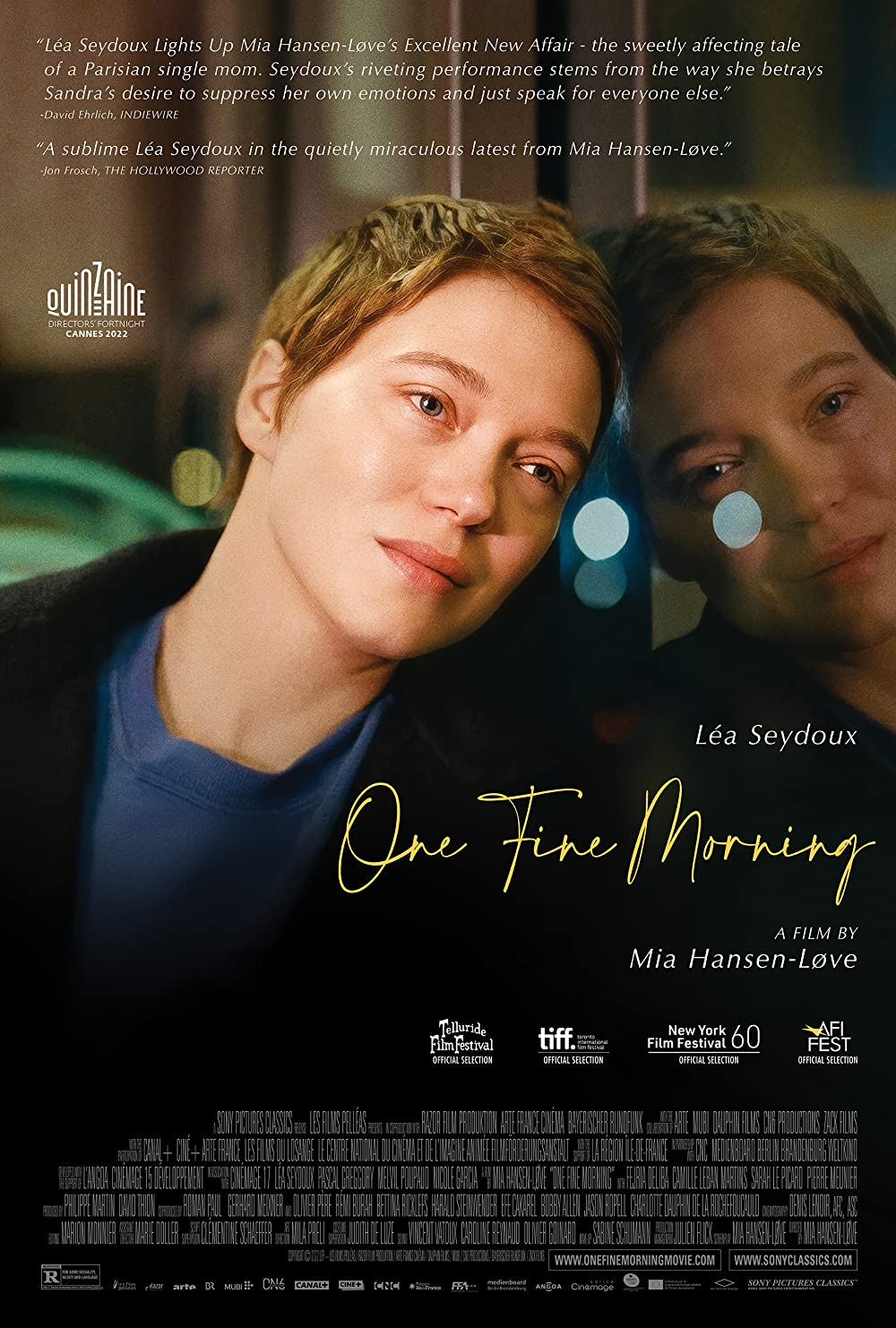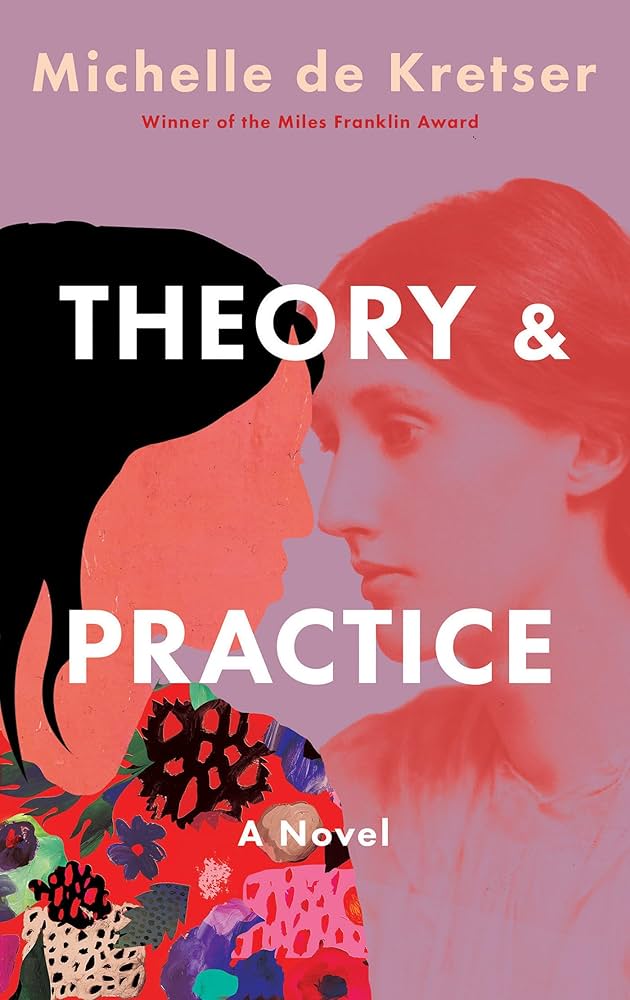Film by MIA HANSEN-LØVE
Review by HANNAH GERSEN

In middle age, many women find themselves members of the sandwich generation: those who are caregivers to both their elderly parents and young children. Such is the fate of Sandra Kienzler (Léa Seydoux), the heroine of Mia Hansen-Løve’s sneakily powerful drama. Set in Paris, Sandra’s story also unfolds in the busy landscape of midlife. She’s both a widowed mother to her school-aged daughter, Linn, and a dutiful daughter to her elderly father, Georg (Pascal Greggory), who is suffering from Benson’s Syndrome, a rare, neurodegenerative disease. In the film’s opening scenes, we see Sandra hurrying from work to visit with her father before picking her daughter up from school. It seems she’s figured out a way to balance everything, but it’s also clear that it can’t last. Georg can no longer open the door without coaching from Sandra or prepare food for himself without help. His disease affects his vision and his memory, and Sandra has to remind him that she works as a translator, and that his favorite author is Thomas Mann. A former philosophy professor, Georg lives alone in an apartment filled with books he can no longer read. He survives thanks to visits from his daughters, Sandra and Elodie, his ex-wife Françoise, and his long-term girlfriend, Leila.
Much of One Fine Morning is concerned with Georg’s decline, and the struggle to move him out of his apartment and to find affordable long-term care. This process is long, drawn-out, and extremely sad for everyone involved. But it’s not the only dramatic thing happening in Sandra’s life: she’s also falling in love with an old friend, Clément (Melvil Poupaud), a married father whose son goes to school with her daughter Linn. It’s Sandra’s first serious relationship since her husband’s death, and it’s immediately intense. The convergence of these two psychically seismic events is what give One Fine Morning its dramatic shape, but it’s the attention to Sandra’s daily activities which gives it a texture that feels remarkably true to life. Sandra may be in a difficult transitional period, with big emotions roiling underneath the surface, but she still needs to get on the bus and head to work; she still has to pick up her daughter from school; she still has to plan for vacations, celebrate holidays, and figure out what on earth to do with all of her father’s books.
By the end of the film, we’ve covered almost two years of Sandra’s life. Hansen-Løve, who also wrote the script, plots her twin arcs of death and love by alternating between the two storylines. A scene between Sandra and Georg is often followed by one between Sandra and Clément, the despair of the first countered the by the joy of the second. Work also has a steadying influence in Sandra’s life. She’s fluent in English, German, and French, and her freelance jobs take her all over the city, where she does live translation at a variety of events: academic conferences, lectures, and commemoration ceremonies. She also translates books, and her interest in Clément is partly sparked by a compliment he pays to her most recent translation, which he read while he was traveling for work. (He’s a scientist who studies cosmic debris, a job that takes him to remote locations all over the world.) The changing seasons and holidays help to mark time, and one of the pleasures of this film is seeing Paris in a variety of moods. Georg’s decline is also a kind of clock, as he becomes more and more detached from reality. The most coherent version of him is the one we see at the beginning of the movie, in the very first scene, when he can barely open the door. Yet, he can still recognize Sandra, and he’s conscious of his surroundings.
One of the most interesting things about One Fine Morning is how it provides a portrait of Georg, and of his life’s work, without much information from Georg himself. The only time we hear what Georg thinks of his life or his illness is near the end of the film, when Sandra finds a diary entry that is a record of his thoughts and feelings around the time of his diagnosis. When the film opens, he is already so faded that it is difficult to know what he was like as a teacher, father, and husband. We must rely on others’ impressions and memories of him, and a sense of his character slowly emerges from observations made by Françoise, Elodie, Sandra, and the nurses who care for him. He seems to be the kind of person who was very present and engaged in his professional life but distant at home, a man whose life was “lived through books.” I also got the impression that he was someone who was vulnerable to depression and anxiety, and his retreat into intellectual life was possibly a way to avoid dealing with these feelings. Françoise (Nicole Garcia) tells Sandra she stayed in the marriage for longer than she wanted because she was afraid Georg would commit suicide—an admission that Sandra isn’t sure how to metabolize. Françoise often shares blunt truths with her daughters, but the impulse doesn’t seem to come from a bitter place. Very often, she’s the film’s comic relief as she describes her exploits as a climate protester, a hobby she seems to have taken up in retirement. She can see the humor in her predicament: the ex-wife who has been living apart from her husband for twenty years but still has to come back for the hard parts. Meanwhile, Georg’s girlfriend Leila rarely visits, but Georg receives her with an affection and gratitude that he rarely shows his daughters or the mother of children. It’s a situation Sandra observes without comment and seems to accept, even as it is clearly painful to her.
Perhaps Sandra is sympathetic to the power of romantic love because she’s feeling it in her own life. She and Clément have an on-again, off-again relationship, and their troubles are of the sort that come about when one partner is married. It takes some time for Clément to decide whether he is going to stay with his wife, and Sandra is often left pining for him. Seydoux does a remarkable job of showing Sandra’s vulnerability in these moments. It’s not just the tears that rise up unexpectedly, and which seem to surprise her, it’s all the emotion she’s holding back when she visits her father and tries to engage with his nonsensical conversations. Seydoux is an actress known for her beauty, a woman whose face adorns Louis Vuitton advertisements, but in this role, the shell of glamour fell away almost immediately, and I felt like I was watching an ordinary woman who just happened to be gorgeous. Part of this has to do with her styling, which is reminiscent of Jean Seberg, with cropped hair and a face bare of make-up. Her clothing is often casual and practical: jeans, sneakers, and sweatshirts or a simple striped tee. And then there’s the backpack that she brings into almost every scene, which ostensibly holds her laptop and work items but also seems to represent the psychic baggage she carries with her at all times.
Sandra’s physical beauty and vitality also serve as a contrast to the many elderly faces we see. Early in the film, Sandra pays a visit to her paternal grandmother, who still lives independently in an apartment building. She has some difficulty getting around, but she can think clearly and express herself. There’s something loving about the way the camera frames her in close-up, looking directly at her, just as Sandra does. She’s significantly older than Georg, with a face that is not only wrinkled, but has begun to lose some of its definition. She complains of health problems but accepts them as inevitable and doesn’t seem unhappy. When the camera turns to Sandra and Linn, who are sitting very close to each other, their youth seems almost alien, as if the life stages of childhood and middle age are completely different realms—which, perhaps, they are, especially as seen here in the French healthcare system. One Fine Morning shows the reality of eldercare as Sandra and her sister search for the nicest place they can afford. Georg is put on multiple waiting lists and must live for a time in a dreary residence with little access to the outdoors. Sandra is painfully aware that there are better options, even if Georg isn’t, and whenever she visits, she had to confront all the other elderly parents, left alone by their families.
One Fine Morning leaves viewers with the question of legacy. Georg’s legacy would seem to be intellectual, as he leaves behind published works, adoring students, and a personal library filled with philosophy and poetry. It seems likely that Sandra’s career choice was influenced by her father’s love of language, as she uses her linguistic gifts to help others understand each other, and to share literature across cultures. Yet, the essential communicative and connecting power of language fails father and daughter in Georg’s final years, when his speech becomes disjointed and illogical. In an attempt to find something from his old life that he can still access and appreciate, Sandra brings in his favorite classical music, but Georg tells her he doesn’t like it, leaving her confused as to what she did wrong. It’s as if the Georg she knows best, and who influenced her most, has disappeared inside another version of her father, one who prefers the company of his girlfriend and simple, romantic melodies from his youth. Hansen-Løve doesn’t present this as a tragic loss; instead she seems to see it as the essence of human experience. She closes her film with a gentle, spare song from Bill Fay, “Love Will Remain,” whose lyric, “Love will remain/when knowledge has passed away,” struck me as an elegant distillation of Georg’s situation at the end of his life as well as something for Sandra to keep in mind as she moves through middle age.
Hannah Gersen is the author of Home Field. Her second novel, Jennifer Hex, is forthcoming from Little A in 2024. In her monthly newsletter, Thelma & Alice, she recommends movies written and directed by women: https://thelmaandalice.substack.com.




